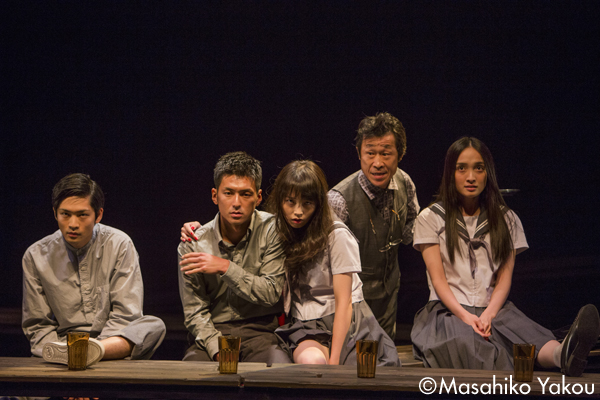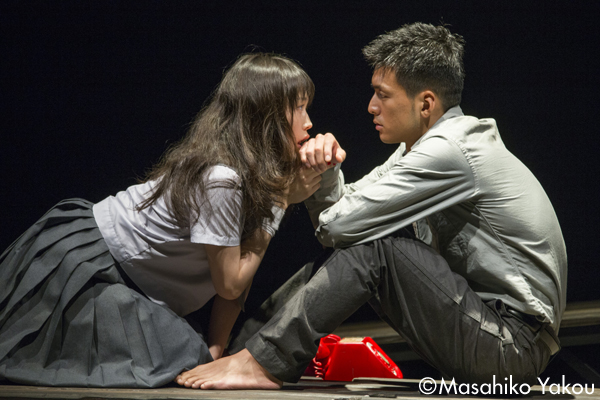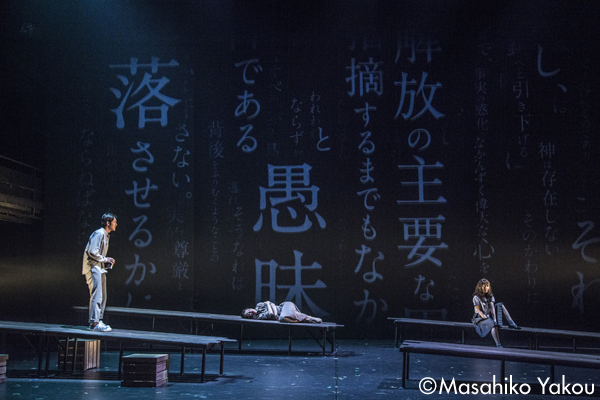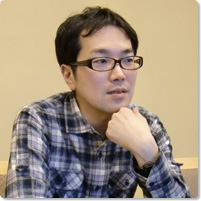Prologue: On the dark stage the images of men and women lying on different levels of climbing platforms slowly come into light. From the top they are Naoichiro Takagi, Naoichiro’s wife, their daughter Tomoko, and Jacob. Standing up with eyes still closed and drinking in some drops of blood, Jacob picks up the receiver of a red phone nearby. A man’s voice says, “Who is this?” Jacob answers, “I am nineteen years old.”
Jacob hangs out at a jazz café and spends his days indulging in drugs and sex. His sexual partners are his girlfriend Cass and her friend Keiko. His friend Yuki watches Jacob’s behavior with uneasiness and concern. Yuki doesn’t become involved in the love affairs of Jacob and Cass and her friend Keiko. Yuki is the heir to a major corporation with business that includes military contracts. However, he hates his parents and their privileged-class lifestyle, and he reveals to Jacob that he has a plan to blowup the company’s building.
Jacob has a history of being put on probation in the past and he had worked at and lived in the dormitory of the company of his mother’s older brother by a different mother, Naoichiro Takagi. From that time, with the smell of the canal flowing nearby the company and talk of his fellow workers about money, betting on horse racing and visits to red-light massage parlors, Jacob had dreamed about a plan to cruelly murder Naoichiro and his family.
He remembers an incident that prevented him from going through with his plan. It was the suicide of a man who ran a small eatery near the factory and his retarded daughter. It happened the very night the daughter told him with such joy that the family was going to be reunited with her mother who had left the home and would start a new life together that the eatery burned down. This tragedy caused Jacob to leave Naoichiro’s home.
Yuki takes Jacob to his family home and tells him the details of his plan to murder his family. Only his physically weak older sister will be spared, and he reveals that he has slept with the sister in the past. Meanwhile, Jacob calls Naoichiro’s home and promises that he will visit soon, since it has been so long. He fantasizes about killing the family by planting a bomb hidden in a box wrapped to look like a present. But, that won’t be done yet.
Wrapped in a blanket with Cass and Keiko, Jacob remembers the rumor in his hometown that it was Naoichiro who got his mother pregnant when he was born. It was that rumor that caused his older brother to hang himself. From his cousin Tomoko, however, Jacob learns that Naoichiro has gotten hooked on speed and his wife has become obsessed with some weird religious cult. He realizes that before he got around to killing them, Naoichiro’s family has already destroyed itself.
One of the young men that had hung out at the jazz café has just died from an overdose of drugs. At Yuki’s room Jacob tries to comfort Rope, the lover of the man that has died. Seeing this, Yuki won’t stop making cynical remarks about death. This angers Cass and causes her to bring out some photos of little girls she found hidden in his room and confront Yuki, asking him if he has a Lolita complex. At this, Yuki bursts out in a rage, venting his anger at the sick world he sees around him, saying that with his still pure body he will kill the elite and go to the land of angels.
Offering to take the place of the dead man, Jacob tells Rope, “Let’s go to Saint-Tropez,” but she turns his invitation down. Once again the memory of the fire returns, along with a sense of Naoichiro’s presence. Meanwhile, Yuki has finally taken the step of sending a bomb threat to his father’s company. Bearing that message, his older brother comes to Yuki, saying, “This won’t solve anything.” He also tells Yuki that his relationship with his sister is only fiction.
Yuki asks Jacob to drive him to the site he intends to bomb. Yuki reminisces how his sister used to put makeup on him when he was a child. The photograph that Cass had was actually a picture of Yuki himself at that time. “Is it my fault that I was born this way?” he asks. After leaving Jacob and the car, Yuki wraps himself in an electric cord and dies alone.
After a drive with Cass, Jacob changes into a white suit and begins to shed tears. He recalls seeing a dog dying one time long ago in his hometown. When Cass says, “Let’s get married,” Jacob nods and taking her, he heads toward Naoichiro’s house. Naoichiro receives them but his behavior is eccentric and largely incomprehensible. Finally he points at them and curses them, saying, “You will be punished by the heavens,” “You maggots!”
“Now is the time to act,” Jacob says to himself. On the way home he drops Cass off and then heads back to Naoichiro’s house. A crowbar is raised again and again. (On the screen we see fragments of text describing the random murder scenes from Nakagami’s novels flying in all directions)
Epilogue: Wandering in the dark, Jacob arrives at the jazz café as always. He goes toward the red telephone. No one answers. But the moment he hangs it up, it begins to ring. When he picks up the receiver, the line goes dead. “How is it? You ….” The buzzing sound that had been heard suddenly stops, and we now hear the music of Coltrane’s jazz.





